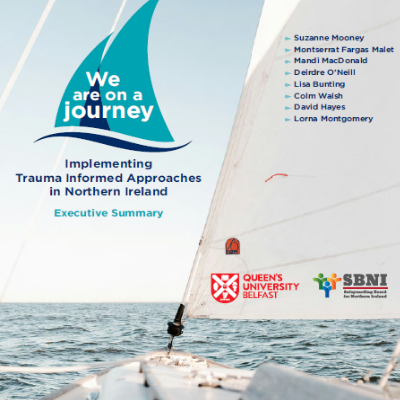We Are On a Journey - Implementing Trauma Informed Approaches in Northern Ireland - an Evidence Report
22 February 2024

Read the Executive Summary report
Full report also available
To cite this report: Mooney, S., Fargas Malet, M., MacDonald, M., O’Neill, D., Walsh, C., Hayes, D. & Montgomery, M. (2024). ‘We are on a journey’: Implementing Trauma Informed Approaches in Northern Ireland. Belfast: Queen’s University Belfast, Safeguarding Board for Northern Ireland
Context
Queen's University Belfast were commissioned by the SBNI to undertake research to:
- (i) update the previous 2018 evidence review sharing key components of effective trauma informed approach implementation in diverse real-world settings;
- (ii) conduct online organisational surveys to the map progress across key sectors in NI;
- (iii) establish a strategic overview of senior leadership assessment of implementation across NI;
- (iv) capture the organisational learning from cross sector mixed method case studies; and
- (v) provide recommendations for advancement of Trauma informed approaches across NI.
The findings of this study were launched on 22 February 2024.
Summary
The research ‘We are on a Journey - Implementing Trauma Informed Approaches in Northern Ireland’ was conducted by a team from the School of Social Sciences, Education and Social Work at Queen’s, led by Dr Suzanne Mooney.
The research team conducted an extensive organisational review of the implementation of trauma informed approaches in Northern Ireland to date. This comprised an international literature review and a bespoke online survey completed by representatives of 53 statutory and voluntary sector organisations. An additional element of the study included 52 senior managers and professionals who participated in cross sector focus groups to assess progress to date across justice, education, health, community, voluntary and social care. The final part was sector specific case studies from Fane Street Primary School, the Salvation Army, the Youth Justice Agency, and the Belfast Health Inclusion Service for homeless people.
Representatives from the NI Executive's Tackling Paramilitarism, Criminality and Organised Crime Programme's Political Advisory Group, comprising Sinn Féin, DUP, Alliance, UUP and SDLP issued a collective statement in support of the research paper launch:
“We welcome this important research paper on implementing trauma informed approaches in Northern Ireland. People in our society experience adversity and trauma in a range of ways, so it is important that we adopt a trauma informed approach across our system if we want to support those who need it most. By doing so, we will improve the life chances for all of society and create the conditions for children, and adults to thrive.”
The importance of adopting such a systemic approach was emphasised by Bernie McNally Independent Chair of the Safeguarding Board for Northern Ireland who said:
“Early adversity and trauma can negatively impact on individuals and communities and their ability to feel safe and to develop trusting relationships. We all deserve to live in a society that prioritises trauma responsive environments, policies, systems and services, that can benefit local people and communities.”
The lead researcher and report author, Dr Suzanne Mooney from the School of Social Sciences, Education and Social Work at Queen’s stated:
“Trauma informed approaches were universally perceived as having ‘no downsides’. They provide many benefits for service users and their family/network, but also for staff and service providers. These are critical issues in light of workforce recruitment and retention challenges across Northern Ireland.”
Key findings
This research calls for the adoption of a trauma informed approach across all systems, organisations, policies and services in Northern Ireland, for the benefit of all in our society. The research found that Trauma Informed Approaches (TIA) offered a wide range of long and short-term benefits for service users and their family network, including improved relationships with providers and access to the right support at the right time. But there were also benefits for staff and organisations, including increased job satisfaction and support, reduced staff sickness and turnover, leading to potential cost savings in the longer-term.
Based on the findings, the report concludes that:
- Recommendation 1: Trauma Informed Approaches (TIAs) are a useful framework to hold together and drive forward a range of strategic priorities across child and adult services in health, social care, justice and education across statutory, community and voluntary sector provision.
- Recommendation 2: A governmental mandate and trauma-informed strategy for NI is now needed to advance coherent and meaningful TIA implementation across sectors and settings. This should be accompanied by designated resources and trauma-informed commissioning requirements to create sustainable change.
- Recommendation 3: There is a need for the development of a regional inter-departmental research and outcomes strategy, and independent evaluation to track TIA implementation progress and evidence outcomes. The development of such a research and outcomes strategy should be undertaken in consultation with organisations to ensure new and existing data collection tools and processes are consistent across NI, considered relevant to participating organisations, and capture the full range of perceived benefits of TIA implementation over time.
- Recommendation 4: A regional NI trauma informed resource hub or centre would be of benefit to facilitate organisational leadership, networking, best practice resources and specialist interest groups and conferences. Such a hub would provide ongoing support for cross-sector, context-specific TIA implementation, and enable learning to be cascaded. Further clarification and support to organisations should also be provided to ensure a consistent understanding across NI of the underpinning principles of TIAs and their implementation in specific settings and sectors, including the relevance for adult services and strategic, governance and commissioning bodies.
- Recommendation 5: A regional training framework should be developed (learning from the Scottish National Trauma Transformation Programme). This will ensure clear differentiation between trauma informed and trauma-focused service provision and enable organisations to progress workforce development and support strategies, aligned with TIA implementation and commensurate with their role and responsibilities.